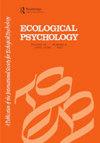The Essential Elements of an Evolutionary Theory of Perception
IF 1.8
3区 心理学
Q3 PSYCHOLOGY, EXPERIMENTAL
引用次数: 3
Abstract
ABSTRACT Traditional theories of perception developed for centuries before Darwin conceived his theory of evolution by means of natural selection. Although many areas of psychological theory and research now have mainstream approaches strongly influenced by evolutionary thinking, mainstream perceptual theory remains close to its pre-Darwinian roots. This paper draws on insights from ecological psychology, especially as represented in J. J. Gibson's The Senses Considered as Perceptual Systems (1966), to identify 4 elements that any future evolutionary approach to perception should be expected to include: (a) an ecological analysis of ambient energy, (b) a comparative understanding of the perceptual abilities of different species, (c) a dynamic understanding of organism–environment interaction as essential for perception, and (d) an understanding of perceptual attunement based on the concept of affordances. Each of these elements serves an essential theoretical role while also pointing toward lines of research where much work remains to be done. The presence of these elements explains, in part, the affinity between ecological psychology and other evolutionarily grounded approaches to psychology, including the emerging fields of enactivism and embodied cognition.感知进化理论的基本要素
在达尔文提出自然选择的进化论之前,传统的感知理论已经发展了几个世纪。虽然心理学理论和研究的许多领域现在都有受进化思想强烈影响的主流方法,但主流知觉理论仍然接近其前达尔文主义的根源。本文借鉴了生态心理学的见解,特别是j·j·吉布森的《感官被视为感知系统》(1966)中所代表的见解,确定了未来任何感知进化方法都应该包括的4个要素:(a)对环境能量的生态分析,(b)对不同物种感知能力的比较理解,(c)对感知必不可少的生物-环境相互作用的动态理解,以及(d)对基于可视性概念的感知调谐的理解。这些要素中的每一个都发挥着重要的理论作用,同时也指向了许多有待完成的研究方向。这些因素的存在部分地解释了生态心理学和其他基于进化的心理学方法之间的密切关系,包括新兴的行动主义和具身认知领域。
本文章由计算机程序翻译,如有差异,请以英文原文为准。
求助全文
约1分钟内获得全文
求助全文
来源期刊

Ecological Psychology
PSYCHOLOGY, EXPERIMENTAL-
CiteScore
3.30
自引率
10.50%
发文量
8
期刊介绍:
This unique journal publishes original articles that contribute to the understanding of psychological and behavioral processes as they occur within the ecological constraints of animal-environment systems. It focuses on problems of perception, action, cognition, communication, learning, development, and evolution in all species, to the extent that those problems derive from a consideration of whole animal-environment systems, rather than animals or their environments in isolation from each other. Significant contributions may come from such diverse fields as human experimental psychology, developmental/social psychology, animal behavior, human factors, fine arts, communication, computer science, philosophy, physical education and therapy, speech and hearing, and vision research.
 求助内容:
求助内容: 应助结果提醒方式:
应助结果提醒方式:


